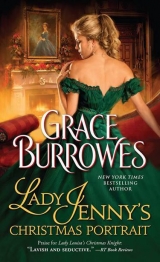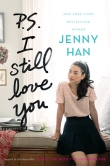
Текст книги "Lady Jenny's Christmas Portrait"
Автор книги: Grace Burrowes
сообщить о нарушении
Текущая страница: 3 (всего у книги 19 страниц)
Three
“Yon beast will not go sound.” Joseph Carrington, Earl of Kesmore, scowled at Elijah’s horse as the gelding was led from the Kesmore stables. “Listen to the footfalls, Harrison. Your hind end is off rhythm.”
And people called artists eccentric.
“Kesmore, good morning. My hind end is traveling down the lane posthaste, though you have my thanks for providing shelter for the night in absentia.”
Kesmore’s frown—the man’s dark features had an entire repertoire of frowns, scowls, glowers, and glares—turned affectionate. “You will forgive my countess for not greeting you here in the yard. She must see to our son’s safe passage up to the house.”
Lady Kesmore, accompanied by a maid, was wending her way from the coach house up a shoveled path toward the manor.
“Congratulations on the birth of an heir,” Elijah said. “I thought you had only the two daughters.”
Kesmore’s affectionate scowl became a long-suffering affectionate scowl. “According to my wife, when the child’s nappies want changing, that boy is my son. When he’s charming every female in the shire, he’s her ladyship’s son. Weren’t you to have immortalized my daughters on canvas at some point?”
He would recall that, and likely recall that Elijah had dodged the commission. Now, Elijah needed juvenile portraits in his portfolio if the Royal Academy was to look favorably upon him, else he wouldn’t be ruralizing away his holidays.
“I apologize for not being here to receive you in person,” Kesmore said as Elijah’s horse was led away. “My lady and I had business in Surrey, and last night we tarried at her sister Sophie’s household rather than push homeward in dirty weather. The womenfolk must disappear into the nursery and exchange maternal intelligence while my brother-in-law and I disappear into his study and say nothing of any consequence beyond, ‘I’ll have one more tot, thank you.’”
“I see.” Marriage had turned the taciturn Kesmore into a chatterbox. The transformation was both disconcerting and… endearing.
“You don’t, but should the Almighty bless you with children, you shall.”
“If the Almighty would see fit to let me get to my next destination without further mishap, I will be most grateful.”
As Kesmore’s wife disappeared into the house, Kesmore resumed his perusal of Elijah. “I trust Lady Jenny made you welcome?”
“Very.” Kesmore’s eyes narrowed, and like an idiot, Elijah babbled on. “She is knowledgeable about art, and her company is enjoyable.” Also a sore trial to his self-restraint, which was why departure this morning was a relief.
Mostly a relief.
The thwack of Kesmore’s riding crop against his boot punctuated the soft whistle of the winter wind. “Lady Jenny can handle the hellions gracing my nursery, which ought to recommend her to half the bachelor princes in Europe. She talks horses with me, poetry with Louisa, politics with His Grace, recipes with—”
Kesmore broke off and waved one black-gloved hand in the direction of the house—a silly wave, hand up, fingers waggling madly. Elijah followed the man’s gaze and saw a woman in a third-floor window with a child in her arms. In a gesture ubiquitous among mothers, she was waving the baby’s tiny hand in Kesmore’s direction.
“The child probably can’t even see you, Kesmore, and he has no notion why you’re fluttering your hand around.”
“Neither do I, and someday, neither will you.” This time Kesmore waved his riding crop at the mother and child, who waved right back. Beside Lady Kesmore, Lady Jenny appeared in the window, a feminine incandescence in an otherwise prosaic tableau.
Elijah did not wave. Not to the baby, not to the baby’s mother, not to his aunt.
“Here comes your noble steed,” Kesmore said. “This is Bacchus. He’s a sensible lad once he gets the fidgets worked out, and he’s not particular about the footing.”
The sensible lad was about the size of an elephant, the same color as an elephant, and possessed of a hair coat worthy of a mastodon. The beast was also making shameless eyes at Kesmore.
“He looks sturdy enough.”
“Much like you, Harrison, he’s a treasure whose subtle gifts can only be appreciated over time. If you’ll excuse me, I’m off to interrogate my sister-in-law regarding the offenses committed by my offspring in my absence. I will take on this thankless burden without my countess’s fortifying presence, while her ladyship tends to obligations in the nursery I am biologically incapable of assisting with.”
This was more married-man-papa blather about Elijah knew not what. To see what a short trip to the altar had done to a decorated veteran of the Peninsular Campaign, a bruising rider, and halfway friend was unnerving.
And yet, Kesmore was… happy. Scowlingly though radiantly happy.
“If you had to choose one of Aesop’s fables as your favorite, Kesmore, which one would it be?”
Kesmore paused midstride toward the manor and turned a puzzled frown on Elijah. “In what regard? A favorite moral, a favorite story? A favorite because the tale is brief and will get my daughters most quickly into bed?”
“Your favorite. The one you liked best when you were a boy.”
The frown disappeared, replaced by a half smile. “‘The Cock and the Jewel,’ I suppose. When a fellow is famished, all the gems in the world will not satisfy his craving for a simple crust of bread, no matter how others might value the pretty jewel.”
Elijah felt a whiff of relief. Little girls could draw roosters and gemstones, particularly with some assistance from their aunt.
“Be off with you,” Kesmore said with a flourish of his whip that had Bacchus looking nervous. “And you”—Kesmore pointed the whip at the horse—“no mischief, or Father Christmas will make you do pony rides all Christmas Day for both girls.”
The horse stood docile as a lamb at the mounting block. Once Elijah was in the saddle, Bacchus turned down the snowy drive without an instant’s hesitation, though Elijah cast one last glance back at the empty third-floor window.
* * *
“What is this?” Louisa, Countess of Kesmore, marched across the nursery and thrust a sketch pad under Jenny’s nose. “It doesn’t look like your work, Sister.”
Louisa did not glide about the house. She did not make small talk. She appropriated neither the airs and graces of a countess nor those of a recently published author whose poetry was acclaimed by the most discerning of the literati. She was simply Louisa: blunt, beautiful, and unfailingly genuine. Jenny loved her for those qualities but was not so enamored of Louisa’s unrelenting curiosity.
“It’s a sketch pad, dearest. The girls leave them all over the house.” With a brother underfoot, they’d learn, as Jenny had, to keep sketches under lock and key.
“I know it’s a sketch pad, Genevieve Windham, but what’s this?” Louisa held out the tablet, flipped open to a pencil drawing of… Jenny, sketching.
Jenny regarded the page with something between dread and fascination. Her hand closed around the sketch pad while her feet clamored to leave the room. “I suppose Mr. Harrison drew it. Some artists must draw compulsively.”
“Like you.” Louisa’s expression held only sympathy. “He’s good, though not as good as you are.”
Louisa was loyal to a fault too.
“Elijah Harrison is the most sought-after portraitist in London, unless you count Sir Thomas Lawrence, who is flooded with commissions and at the regent’s beck and call.”
“Which you ought to be. His sketch of you is quite good.” Louisa came closer to study the drawing. “He’s caught how fiercely you concentrate, like a raptor focusing on her prey.”
“Louisa, I know you are a poetess, but that image is hardly flattering to a lady.”
“Elijah Harrison has also caught you as a woman, Jenny. He drew you full of curves and energy, a female body engaged in a passion, not some drawing-room artifact showing off her modiste’s latest patterns. He sees that your beauty is not merely physical.”
Was that why he’d kissed her, or had it been merely a passing holiday gesture? “You are fanciful, Louisa.”
“I am honest.”
Both could be true, but one didn’t argue logic with Louisa and win unless one was Joseph. “Why do you say I’m better than Mr. Harrison?”
Louisa flipped back to the sketch of Fleur. “Look at this.”
“It’s very accurate, and if he had time to sketch me, as well, he drew both quickly.”
And why had he sketched Jenny, and then told her specifically to examine this sketch pad as he’d trotted out of her life?
“Portraiture is not exclusively about rendering an accurate image,” Louisa said. “Fleur is a happy little soul. She doesn’t have Amanda’s inquisitive nature or impulsivity; she likes to make others happy. Fleur is quick to sense others’ feelings, like my Joseph, but she hasn’t Joseph’s analytical bent.”
Louisa spoke with the assurance of a mother who knew her children. Fleur and Amanda were Louisa’s stepchildren, and Louisa had only known them a year; and yet, by virtue of marital alchemy, Louisa was their mother too.
Jenny did not point out that Louisa’s husband was quick to sense Louisa’sfeelings, and probably only Louisa’s feelings.
“What is your point, dearest?” Louisa always had a point, sometimes arcane, sometimes irrelevant to anybody else, but she had a point. Jenny wanted to flip back to the sketch Mr. Harrison had done of her, to study it, to copy it, to see what he had seen when he’d drawn her. Maybe that sketch had a point too.
Louisa moved away, grabbing a receiving blanket from a pile folded near the hearth and shaking it out. “Mr. Harrison didn’t sketch Fleur. He sketched some little girl who looks like Fleur trying to make a drawing. He sketched what he saw, not what he felt.”
Jenny studied the drawing again, and admitted that Louisa’s conclusion was… not invalid. The image was accurate and whimsical, but not… Fleur. Her little-girl eyes, so full of life and vulnerability, didn’t stare up from the page. “He doesn’t know Fleur.”
This was true—it was also a defense of an artist who needed no defending.
“I suspect he doesn’t know children, or he doesn’t know a nature like Fleur’s. She’s purely sweet and easy to love, much like you.”
“Gracious, Lou, you’ve gone from spouting poetry to spinning fiction. I’ll leave you now and give your regards to dear Sophie.”
“And Joseph’s regards to Sindal too please, and keep the sketches, Jenny. I think Mr. Harrison meant them for you.”
Louisa didn’t smirk as she made that observation. Her green eyes held a touch of pity, though, the same pity Jenny bore lately from her aunt and uncle, her cousins, her siblings, and—she would swear to this—her very own cat.
As she drove the pony cart over the snowy lanes to her sister Sophie’s domicile, Jenny tried not to consider that pity, and yet, it circled her awareness like a shark among shipwreck victims.
The pity rankled because Jenny was pouting over Elijah Harrison passing through her life, leaving her a sketch, and departing without a backward glance.
Pouting was for children, which she would never have. Her family was a group of perceptive, forthright people, and yet, they would not talk about a sister who wanted to pursue art instead of holy matrimony.
They would only pity her.
“For Christmas, I would like to be spared my siblings’ pity.” The pony, a shaggy little scrapper by the name of Grendel, shook his harness bells as if in reply. “I would like to be appreciated for who I am, for my art, and yet…”
As she turned the little gray up the Sidling driveway, Jenny buttoned up her untoward resentments and longings. Paris was a dream, not a just desert.
Sophie, Baroness Sindal, was waiting in the foyer of her sprawling Tudor home, little Kit clinging to her skirts, and the baby—he wasn’t really a baby anymore—perched on her hip.
“Jenny, welcome! Sindal, take the children and let me have a moment with my long-lost sister.”
Sophie’s tall, blond husband hoisted the younger child to his hip and took Kit by the hand. “Jenny, you see how it’s to be. The menfolk banished to the nursery while temptation wafts up from the kitchen. I ask you, how are we to be good little boys when faced with such an ordeal?”
Sindal stood well over six feet, and yet around Sophie he was a very good boy indeed.
“Papa, pick me up!” Young Kit held his arms up and was obliged with a perch on Sindal’s other hip. “’Lo, Aunt Jen Jen!”
Kit shouted everything. Jenny could not recall the last time she’d shouted anything, and silently applauded the boy’s boisterous approach to life.
“Hello, Master Kit. When your mama and I have finished the stollen, will you come down and sample it for us?”
She reached a hand out to tousle his blond curls but stopped short of her goal, fingers outstretched, the child grinning at her. A queerish feeling came over her. Were she not a lady, she would have called it excitement. “Whose scarf is that?”
The scarf in question hung on a hook in the foyer, draped over a gentleman’s greatcoat, the pattern an unusual plaid done mostly in dark purple. When she’d first beheld that scarf, Jenny had noticed the colors—a green stripe, a lavender stripe—because the scheme had been unusual but quite pretty.
“That would be mine.”
Elijah Harrison emerged from the drawing room down the hallway and bowed in Jenny’s direction. “Lady Genevieve, we meet again.”
He was smiling. He was smiling, and he was here, and though she knew her sister, her nephews, and even Sindal were watching her, Jenny was helpless not to smile back.
* * *
Elijah was used to working in spaces not entirely conducive to producing good art, much less great art. He was used to manufacturing sunlight where none existed, opulence of setting where none had everexisted, and personality traits—charm, dignity, sagacity, even chastity—his sitters’ own mothers would never have ascribed to them.
He was not, however, used to ignoring the scent of Christmas baking while he set up his studio. Worse yet, through some quirk of antique architecture, he could hear Lady Jenny’s voice wafting up from the kitchen through the flue, hear her laughter and the lilt and rhythm of her speech, though he couldn’t make out a single word she said.
Fortunately, the Evil Chimney of Distraction had fallen silent about a half hour ago.
Elijah moved furniture around to make window light more available. He organized stretched canvasses, pigments, linseed oil, walnut oil for the lightest colors, brushes, and the containers where he stored bladders of paint, then he moved the furniture around some more.
Where was she?Was she staying under the same roof as he?
“Mr. Harrison?”
At first he thought the chimney had spoken to him, then he realized Lady Jenny stood in the doorway to the guest room he was converting to artistic use.
He bowed. Not because she was a duke’s daughter, not even because she was a lady. He bowed because something in him finally was able to focus now that he knew where she was—and because she was carrying a small tray. “Lady Jenny.”
“I’m having tea sent up, and I brought you some stollen fresh from the kitchen. I gather this is where you are to work?” She hovered in the doorway, much as she had at Kesmore’s house the previous night.
“My temporary studio, the most recent of many. Won’t you come in?”
Won’t you please come in?
He shoved two heavy chairs nearer the hearth, then realized he hadn’t lit the fire. “I apologize for the cold. Moving furniture about warms one up.”
She came closer, peering around as if in a curiosity shop. “You have some of the heat from the kitchens too, I think.”
“Which we will lose if that door remains open.” He crossed the room to shut the door, and not because the room would get cold. “Shall I light a fire for you?”
She set the tray down on the raised hearth and sent him an unfathomable look. What had he said? What had she inferred? Why was she destined to find him in shirtsleeves, cuffs turned back, rumpled, and untidy? He cleaned up decently when he made the effort.
“The tea will be along presently. That will warm us up if needs must. You made a sketch of me.”
She wanted to talk about art, and he wanted to eat whatever was on that tray and simply behold her.
“You made one of me. Artists often perform reciprocal courtesies for one another. For years, my anatomy was available to model for Antoine’s students.” He should nothave said that.
“I know.”
And she reallyshould not have said that.
The knock on the door felt every bit as intrusive to Elijah as if they had been on the point of a kiss—another kiss—or perhaps on the point of issuing each other a challenge.
“That will be our tea.” He hustled over to the door, took the tray from the maid in the hallway, and closed the door in the servant’s face. “Shall you pour?”
“While you butter our bread.” She smiled as if this informal, impromptu picnic were a delight to her. Her smile wasn’t loud, and it wasn’t particularly merry.
That smile—he was astonished to conclude—was a trifle naughty.
He dropped into one of the heavy chairs without asking her permission and lifted the linen from the small tray. The scent of yeast and sweet bread hit his nose, and in the chilly room, fragrant steam rose from the half loaf of bread.
“Cutting it when it’s warm takes skill,” she said. “You need a good sharp bread knife and a light touch. Don’t mash it.”
She stirred cream and sugar into his tea while he feathered slices of holiday bread from the loaf. “You don’t skimp on the goodies.” The loaf was liberally full of candied fruit and nuts, to the point that Elijah’s mouth watered.
“My sister Sophie doesn’t skimp on anything related to the comfort or pleasure of her family. This is her recipe, or her version of our grandmother’s recipe.”
“Your grandmamma was German?” The tea in his cup was steaming too. To make a painting of steam was difficult—probably better suited to watercolors than oils.
“We’re German on Her Grace’s mother’s side. My father would call it the dam line, and he’d use that language in company too. About that sketch, Mr. Harrison?”
He passed her a thoroughly buttered slice of warm holiday bread. “First things first. I arrived here after luncheon was served because I detoured clear back to the posting inn to make sure my baggage had been sent on ahead.”
“And like a man, you did not want to impose on the kitchen when you got here, and you forgot to see to your victualing at the inn because you had a task before you. When you arrived here, you denied my sister the pleasure of caring for an honored guest—and you went hungry.”
She was scolding him, which made him want to miss more meals so she might scold him some more. Surely the cold was addling his wits? “You have no patience for the starving-artist mentality?”
She held up her slice of bread, regarding it as melted butter drizzled onto her plate. “Art should be joyful, so joyful it sustains its creator in ways that have nothing to do with physical nourishment.”
He took a bite of bread rather than snort at her naïveté. He’d believed the same thing, once upon a long, silly time ago. “Art should be pretty and remunerative. You say I’m an honored guest, but in reality, I’m a tradesmen reluctantly admitted into houses above my station.”
She took a dainty bite, chewed slowly, and turned an innocent pair of green eyes on him. “You are the heir to a marquess. By rights, you are the Earl of Bernward. You outrank most of your subjects, though I suspect you keep the title quiet because your patrons would be self-conscious in your presence otherwise. Commendable of you, from an artistic standpoint.”
He hadn’t seen that salvo coming, and so he reacted less carefully than he ought. “How do you know I modeled for Antoine?”
Her ladyship munched another bite of holiday bread, not a discernible care in the world. “Your tea is getting cold, Mr. Harrison. I attended those classes whenever I could. Your generosity as a model did much to improve my understanding of the male body.”
He finished his tea in two swallows. “Women were not permitted into those classes. Not ever.” And yet, he’d known she was there practically from the first.
She popped the last bite of her bread into her mouth and dusted her hands together. “I grew tired of drawing kittens and… flowers, much as you might occasionally grow tired of painting corpulent old lords, aging beauties, and strutting lordlings.”
A Renaissance master would have known what to do with her. She was heartrendingly beautiful to the eye, more beautiful the longer he studied her, and yet—she was a minx too. On the order of a saint who prayed with her eyes turned heavenward and much of her cleavage exposed. She likely didn’t appreciate this aspect of her own personality though, which created a conundrum.
“The lordlings are the worst, and I knew you were in Antoine’s classes.”
All the languor in her manner disappeared. While Elijah watched, a blush crept up her neck, turning her perfect complexion quite, quite rosy.
“I suspected you knew when you came to Joseph’s door last night. May I ask how I was found out?”
Relief swept through him, odd but welcome. She’d been bluffing. Those looks, that thoughtful chewing, the “your tea will grow cold” nonsense had been her attempt at a sophisticated repartee foreign to her nature. He held out another piece of buttered sweet bread to her and wondered why she’d try to misrepresent herself.
“Your sketches were always the best,” he said, helping himself to more tea. “And yet, you never asked many questions, never spoke much at all. You were one of few students who had the sense to move around the room, to change your perspective on the subject from week to week. You took risks. You got down to business as soon as Antoine had described the exercise, and Antoine always had a few words to say to you when he wandered among the students.”
“From that you deduced my identity?”
“Drink your tea before it cools, my lady.”
His words provoked her minx-smile, which hadn’t been their intended effect. He buttered himself more bread rather than smile back. “I followed you home, except you didn’t go directly home. You went in the back door of a modiste’s establishment, and no matter how long I waited, the pale young man with so much dedication and talent never emerged.”
“Though Lady Jenny Windham did.”
“If it’s any consolation, I needed several attempts to figure out your scheme.”
She tore off a bite of bread but didn’t eat it. Even her fingers were beautiful—slender, graceful, elegant. “Why concern yourself at all, Mr. Harrison? You are the darling of the Royal Academy, your talent beyond question. Why would you care about one casual art student?”
A clever reply would have served them both well. They could smile false smiles at each other, finish the tea and crumpets, and perhaps dance a minuet before his nightly nap in the card room if they ended up in the same ballroom next Season.
Half a secret exchanged for half a secret.
He watched the holiday bread crumble to bits in her fingers and chose a different path. “I worried for you.”
She studied her buttery fingers while Elijah tried to find something else to occupy his imagination. “You worriedfor me, for my safety perhaps?”
Did nobody ever worry for her? Or did she never allow her loved ones to know what she was really about?
“You were safe as houses on the streets of Mayfair in broad daylight, even when you went sauntering down St. James Street in your masculine regalia at midafternoon.” That had been naughty of her—also brave.
“One wants to see more than candlelit ballrooms and sunny bridle paths, Mr. Harrison. What I saw was a clutch of dandies lounging in the windows of the men’s clubs, pretending a perfectly prosaic street scene somehow merited their devoted study. They reminded me of the lions at the menagerie—tame, twitchy, bored, and helpless to address their own miseries.”
Her description was deadly accurate. “I noticed you did it only the once.”
“One need not… I wasn’t doing it to be daring. I wanted to see. Why were you worried for me?”
Afternoon tea should have been an occasion for some flirtation, a little sustenance, and maybe—if he flirted well and she were receptive—a bit of sketching. Elijah wasn’t sure what to call their exchange, but it was notflirting.
“You never fraternized with the other students, never arrived or left with them. You never joined in the stupid, self-conscious banter that ensues when young men are in the presence of nudity.”
She was regarding him with carefully masked bewilderment. He forged on, driven by motivations he was not going to examine closely unless thoroughly drunk.
“When one is talented, particularly early in one’s career, one can suffer doubts. In my experience, the doubts can be commensurate with the talent rather than inversely proportional to it. The myth of the sensitive artistic disposition is not entirely false, and I didn’t want…”
What was he saying? What was he babbling?
She picked up his uneaten slice of bread and held it out to him. “You did not want the quiet, withdrawn, somewhat talented student to doubt himself—herself—to the point of loss of confidence or foolish actions.”
He took the bread and stuffed a large bite into his idiot mouth. Lady Sindal’s recipe was scrumptious, and it went down like so much sawdust.
Lady Jenny held up his teacup. He washed the sawdust down with bilge water.
“Thank you, Mr. Harrison. Nobody has ever worried for me like that, and I suspect nobody ever will. Instead, they pity me. I prefer your worry to their pity, though I must apologize for giving you concern. I thank you, but I apologize too.”
The smile she offered him now was not that of a minx. They had shared secrets of a sort, it said—more secrets than she’d known—and she was pleased it was so. The silence that descended was profound. No clock ticked; no fire roared. Outside, the frightful weather had subsided to a cold, still winter day.
Inside, something expanded in Elijah’s chest—relief, happiness, he cared not what the best description might be, because words did not move him, and yet, words were necessary too.
“Lady Jenny, may I sketch you?” Those words were close but not exactly right, so he tried again. “Genevieve Windham, may I please sketch you?”








